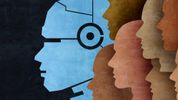Healthcare, an industry vital to our lives, often appears shackled to antiquated methods like fax machines. But, don't let this mislead you; the sector is on the brink of a seismic transformation through the application of Artificial Intelligence (AI).
AI is poised to penetrate healthcare more effectively than traditional enterprise software ever could. Although healthcare's contribution to the American economy stands at 20%, only one among the top 100 public software firms caters to this industry. The dearth of software-oriented healthcare solutions is due to the industry's slow tech adoption, borne out of hesitation to burden IT teams and to avoid further fatiguing an already stressed workforce.
However, a game-changing shift is on the horizon. The healthcare sector is set to bypass the adoption of traditional vertical software, much like how emerging markets skipped the credit card era and jumped straight into mobile payments. This "leapfrogging" will happen due to AI.
Healthcare technology companies are now able to bypass the arduous task of training staff on software systems. They can provide AI solutions that act like humans, taking up tasks, allowing healthcare professionals to focus on more critical issues. These AI 'assistants' are affordable, fast, always pleasant, and capable of empathy.
The effectiveness of any new technology lies in its ability to be significantly superior to its predecessor, and AI passes this test with flying colours in healthcare. Initially, AI will revolutionise non-clinical tasks like scheduling, prior authorisation, revenue cycle management, and dealing with medical bills.
The clinical realm isn't far from an AI revolution either. AI systems can already ace medical licensing exams and interpret X-rays as well as a radiologist. In the near future, AI's accuracy in medical diagnosis and treatment recommendations will outstrip humans. Regulatory frameworks are already in place to allow clinical AI, promising a future where every doctor has an AI co-pilot.
The most significant benefits of AI adoption in healthcare will be in solving the two most persistent issues—access and cost. AI will bridge the accessibility gap by reducing waiting times and enabling faster diagnoses. This technology will allow individuals to have a top-notch AI doctor at their disposal, expediting interventions and enabling human doctors to dedicate their time more effectively.
On the cost front, AI will drastically reduce expenditure by transforming the current all-human services to AI-augmented ones. The cost of AI implementation may be higher than traditional software systems, but it is significantly lower than human services. The future of healthcare is one where high-quality medical care is affordable for everyone, and medical debt isn't the leading cause of bankruptcy.
AI is the breakthrough that healthcare has been waiting for. With the combination of data availability, foundational models, and growing interest, AI is set to have an unprecedented impact on healthcare. It's poised to solve the industry's biggest challenges, potentially saving countless lives in the process.
With AI, healthtech companies no longer need to fight the uphill battle of training people on software. Instead, they can sell AI that acts like a person and takes more and more of the work off healthcare professionals’ plates, enabling them to work on more interesting problems and practice at the top of their licenses.
https://a16z.com/2023/08/02/where-will-ai-have-the-biggest-impact-healthcare/
 unknownx500
unknownx500




